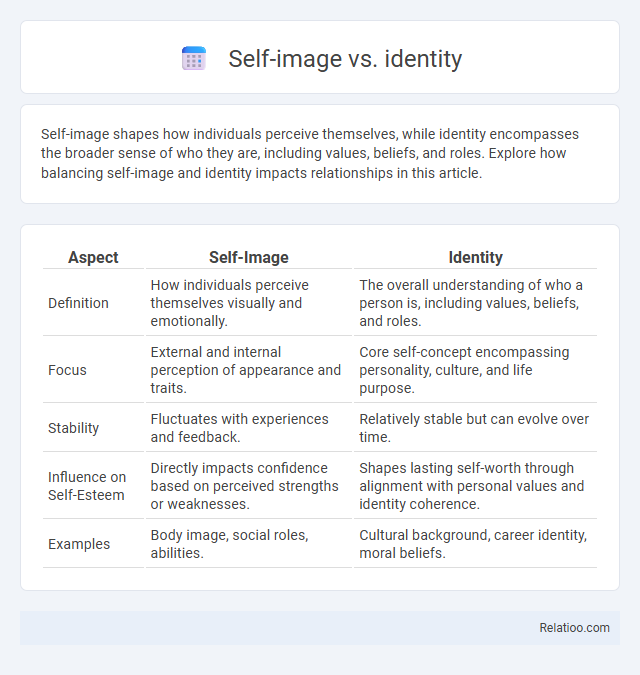Self-image shapes how individuals perceive themselves, while identity encompasses the broader sense of who they are, including values, beliefs, and roles. Explore how balancing self-image and identity impacts relationships in this article.
Table of Comparison
| Aspect | Self-Image | Identity |
|---|---|---|
| Definition | How individuals perceive themselves visually and emotionally. | The overall understanding of who a person is, including values, beliefs, and roles. |
| Focus | External and internal perception of appearance and traits. | Core self-concept encompassing personality, culture, and life purpose. |
| Stability | Fluctuates with experiences and feedback. | Relatively stable but can evolve over time. |
| Influence on Self-Esteem | Directly impacts confidence based on perceived strengths or weaknesses. | Shapes lasting self-worth through alignment with personal values and identity coherence. |
| Examples | Body image, social roles, abilities. | Cultural background, career identity, moral beliefs. |
Understanding Self-Image: Definition and Components
Understanding self-image involves recognizing how you perceive yourself based on physical appearance, personality traits, and social roles. Self-image is a mental picture influenced by internal beliefs and external feedback, shaping your confidence and behavior. Distinguishing self-image from identity and self-esteem helps clarify how you interpret experiences and respond to personal challenges.
What is Identity? Core Elements Explained
Identity represents the deeply rooted core of who you are, encompassing your values, beliefs, and social roles that define your unique existence. It consists of key elements such as personal traits, cultural background, and life experiences that shape your sense of self beyond mere appearance or external perception. Understanding your identity helps align your self-image, allowing you to foster authenticity and psychological well-being.
Self-Image vs Identity: Key Differences
Self-image refers to how individuals perceive themselves based on their own beliefs, feelings, and experiences, while identity encompasses a broader concept involving social roles, cultural background, and external labels that define who a person is. The key difference lies in self-image being an internal, subjective view, whereas identity includes both internal perception and external recognition by society. Understanding the distinction between self-image and identity is crucial in psychology for addressing self-esteem, personal development, and social interactions.
How Self-Image Shapes Personal Perception
Self-image profoundly influences your personal perception by acting as the mental blueprint of how you see yourself, which in turn shapes your thoughts, emotions, and behaviors. Unlike identity, which encompasses your broader social roles and values, self-image is a dynamic internal reflection that directly affects confidence, decision-making, and interpersonal relationships. Understanding and improving self-image can lead to enhanced self-esteem and a more authentic expression of your true identity.
The Role of Identity in Social Interactions
Identity serves as the foundational framework guiding your social interactions by shaping how you perceive yourself and how others recognize you within various social contexts. Unlike self-image, which reflects your personal evaluation and feelings about yourself, identity encompasses the roles, group memberships, and cultural affiliations that influence behavior and communication patterns in social settings. Understanding the interplay between identity and self-image enhances your ability to navigate relationships and fosters more authentic, meaningful connections.
Factors Influencing Self-Image Development
Self-image development is shaped by factors such as social interactions, cultural background, and personal experiences, which collectively influence how You perceive yourself. Identity encompasses a broader, more stable understanding of who You are, integrating values, beliefs, and roles over time. Distinguishing between self-image and identity helps clarify the dynamic nature of self-perception and its roots in external feedback and internal reflection.
Cultural Impact on Identity Formation
Cultural impact plays a crucial role in shaping identity, influencing how individuals perceive their self-image and define their sense of self. Identity formation is deeply intertwined with cultural values, traditions, and social norms that provide a framework for self-concept and belonging. This cultural context affects the alignment or tension between self-image--the personal view of oneself--and the broader collective identity derived from cultural heritage.
Self-Esteem, Self-Image, and Identity: Connections
Self-esteem, self-image, and identity are interconnected aspects of your psychological makeup, with self-esteem reflecting your overall sense of self-worth, self-image representing how you perceive yourself visually and behaviorally, and identity encompassing your core beliefs, values, and roles. A positive self-image enhances self-esteem by reinforcing confidence, while a strong, coherent identity provides a stable foundation for consistent self-perception and emotional well-being. Understanding the dynamic relationship between these elements helps you develop healthier self-concepts and improve interpersonal interactions.
Navigating Conflicts Between Self-Image and Identity
Conflicts between self-image and identity arise when an individual's perceived traits clash with their core sense of self, causing internal dissonance and emotional distress. Resolving these conflicts requires mindful reflection on personal values, experiences, and social influences to realign self-perception with authentic identity. Strategies such as cognitive restructuring and seeking supportive feedback can facilitate integration, promoting psychological well-being and consistent self-concept development.
Strategies for Building a Positive Self-Image and Authentic Identity
Developing a positive self-image requires recognizing and challenging negative self-perceptions while embracing your strengths and achievements. Building an authentic identity involves consistent self-reflection and aligning your actions with your core values and beliefs. You can strengthen both by practicing mindfulness, seeking feedback from trusted sources, and setting realistic personal goals that reflect your true self.

Infographic: Self-image vs Identity
 relatioo.com
relatioo.com